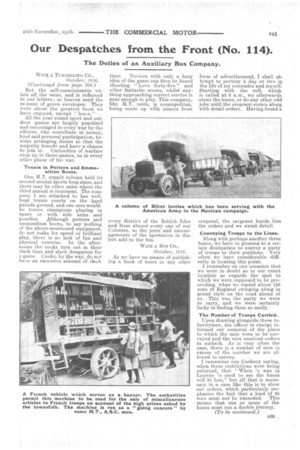Our Despatches from the Front (No. 114).
Page 5

If you've noticed an error in this article please click here to report it so we can fix it.
The Duties of an Auxiliary Bus Company.
Win( A TUNNELLING CO., October, 1916. (Continued from pace 238.)
But the self-consciousness exists all the same, and is reflected in our letters ; so heaven send the re-issue of green envelopes. They were about the greatest boon we have enjoyed, except "leave." All the year round sport and outdoor games are largely practised and encouraged in every way by the officers, who contribute in money, kind and personal participation, besides arranging duties so that the majority benefit and have a chance to join in. Curiosities of warfare crop up in these games, as in every other phase of the war.
Tennis in Puttees and Ammunition Boots.
One M.T. supply column held its second animal sports long since, and there may be other units where the third annual is imminent. The company .1. am attached to has wellkept tennis courts on the hard parade ground, and one sees wouldbe tennis champions playing in spurs or with side arms and pouches. Although puttees and ammunition boots, to say nothing of the above-mentioned equipment, do not make for speed or brilliant play, there is no lack of fun and physical exercise. In the afternoons the cooks turn out in their slack time and slack dungarees for R. game. Cooks, by the way, do not have an excessive amourit of slack time. Novices with only a hazy idea of the game can then be heard shouting "Love forty-five" and other fantastic scores, whilst anything approaching correct service is near enough to play. This company, like M.T. units, is cosmopolitan, being made up with miners from
every district of the British Isles and from almost every one of our Colonies, so the jeers and encouragements of the spectators in dialect add to the fun.
Wins A Bus Co., October, 1916.
As we have no means of publishing a book of tours or any other form of advertisement, I shall attempt to portray a day or two in the life of my comrades and myself. Starting with the roll, which is called at 6 a.m., we afterwards clean the buses, or do any other odd jobs until the sergeant comes along with detail orders. Having found a corporal, the sergeant hands him the orders and we await detail.
Conveying Troops to the Lines.
Along with perhaps another three buses, we have to proceed to a certain destination to convey a party , of troops to their positions. Very often we have considerable difficulty in locating this point.
I remember on one occasion that we were in doubt as to our exact location as regards the spot to which we were supposed to be proceeding, when we espied about 150 sons of England swinging along in grand style on the road ahead of us. This was the party we were to carry, and we were certainly lucky in finding them so easily.
The Number of Troops Carried. Upon drawing alongside these infantrymen, the officer in charge informed our corporal of the place to which the men were to be conveyed and the men received orders to embark. As is very often the case, there is a number of men in excess of the number we are allowed to convey. I remember one Cockney saying, when these restrictions were being enforced, that "When 'e was in Lon nun 'e used to see the buses wid 34 bon," but all that is necessary in a ease like this is to show our orders, which particularly emphasize the fact that a load of 25 men must not be exceeded. This means that one or more of the buses must run a double journey.
(To be continued.)






















